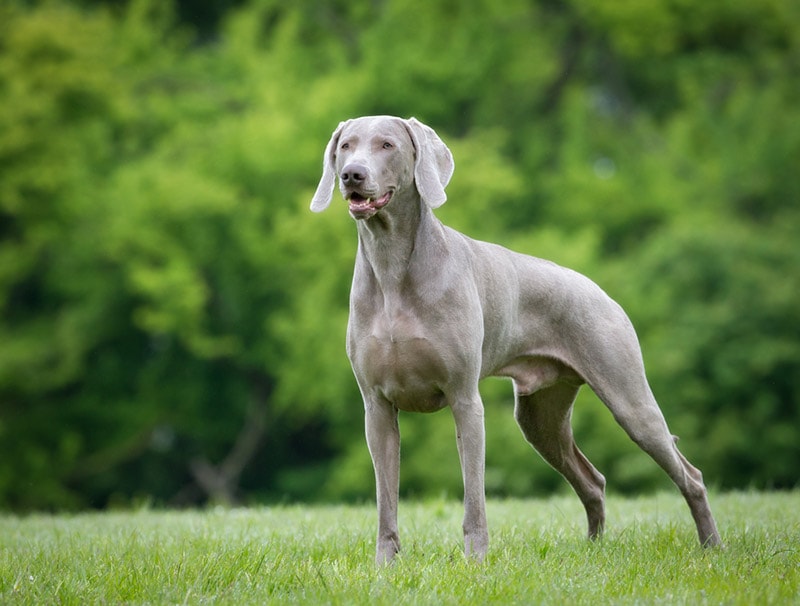Poodle vs. Goldendoodle: The Key Differences (With Pictures)
Updated on
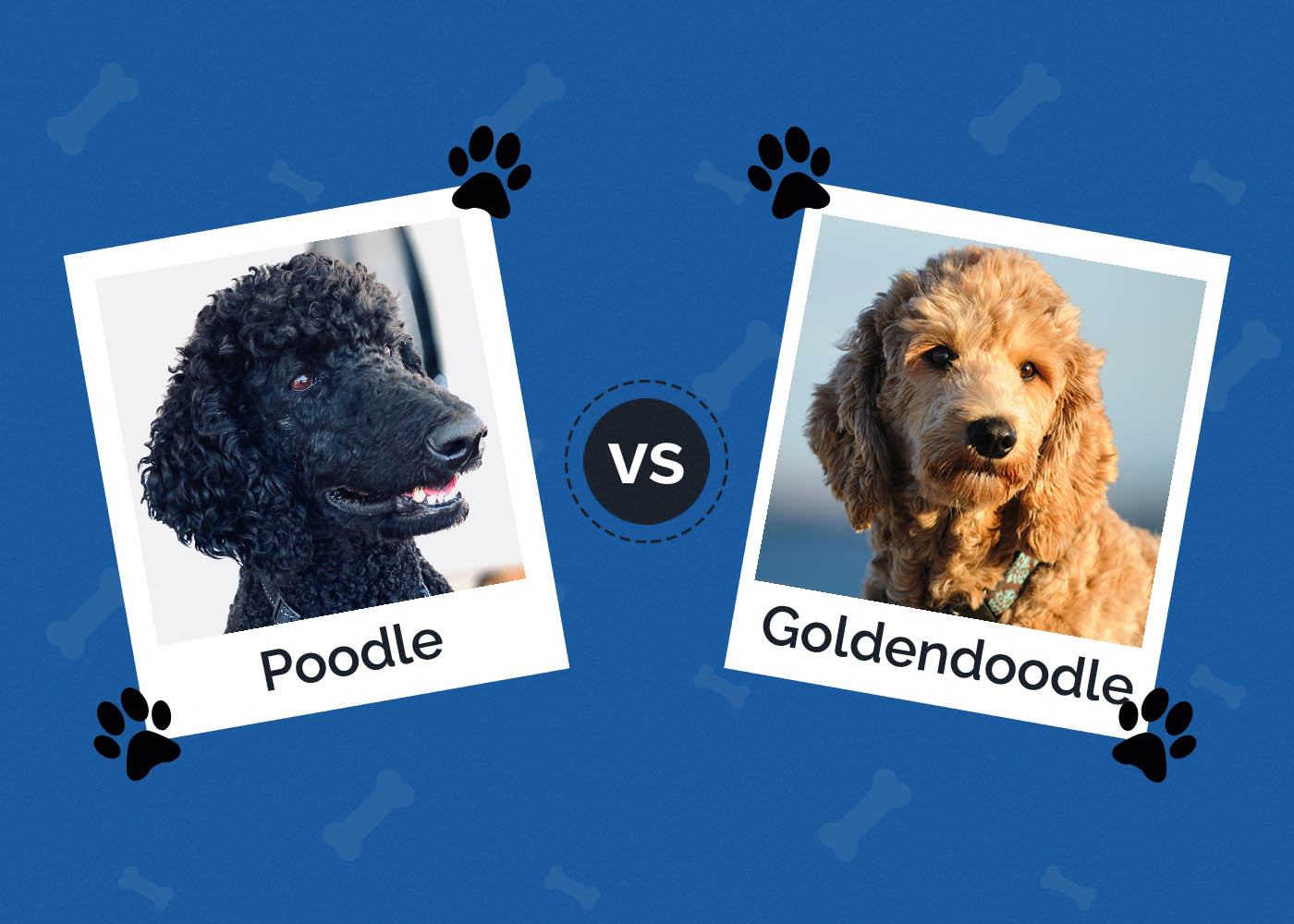
Poodles have never exactly been trendy dogs. However, their low-to-zero shedding and extreme intelligence have landed them in the hearts of many. So much so that the Goldendoodle was born. This mixed breed combines the Poodle and the Golden Retriever into a companion animal. As you’d expect, these dogs exhibit traits from both parents.
While the Goldendoodle is often described as being the best of both worlds, it is also possible for them to be the worst of both worlds. They have become increasingly popular, but that doesn’t mean they are for everyone.
When deciding between a Goldendoodle and Poodle, it may seem like there are only a few differences. However, there are many ways these two breeds differ.
Visual Differences
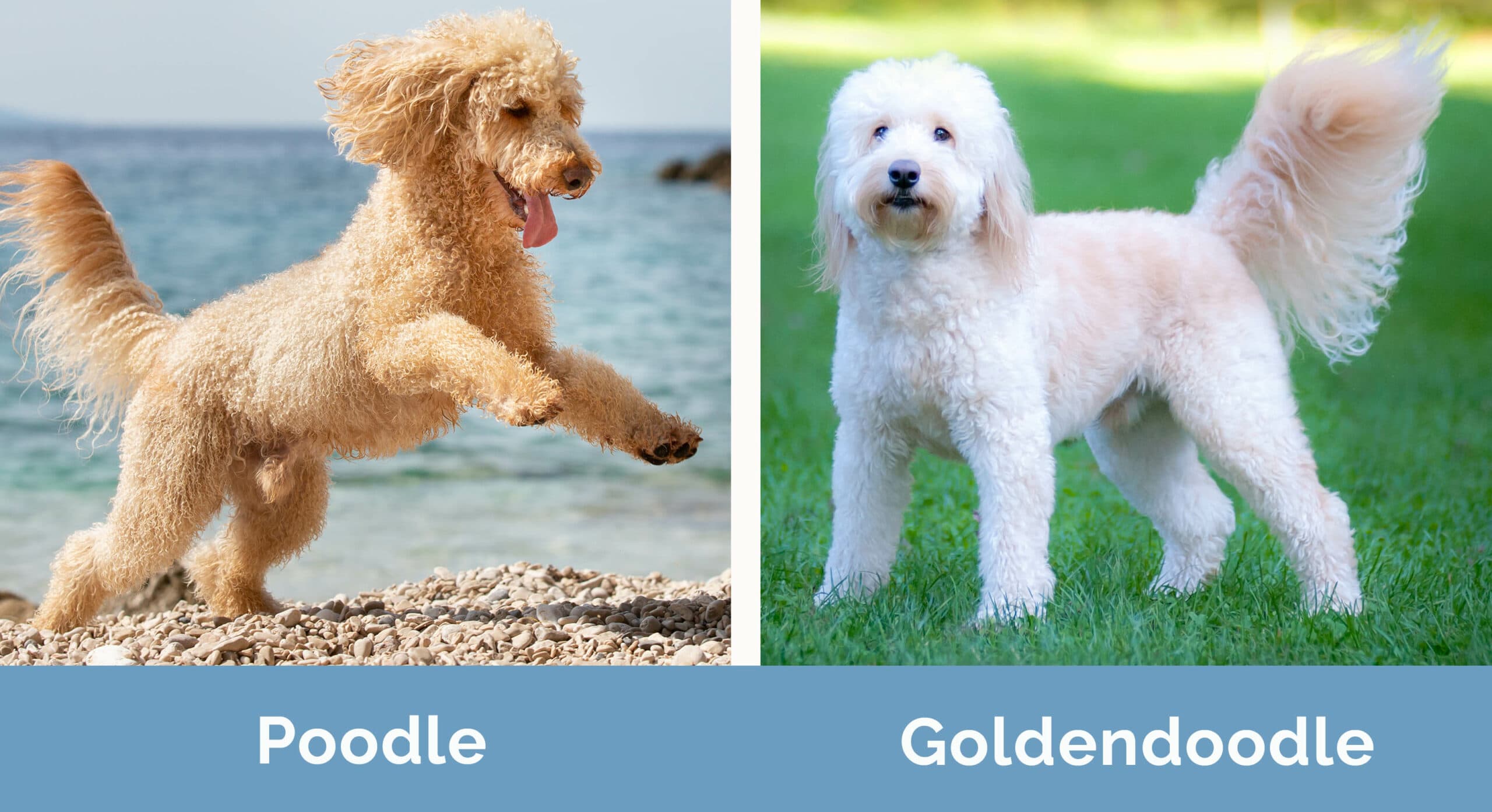
At a Glance
- Average height (adult): More than 15 inches
- Average weight (adult): 44 – 71 pounds
- Lifespan: 12 – 15 years
- Exercise: 1+ hours a day
- Grooming needs: High
- Family-friendly: Yes
- Other pet-friendly: Yes
- Trainability: Intelligent
- Average height (adult): 17 – 21 inches and up
- Average weight (adult): 50 – 90 pounds
- Lifespan: 10 – 15 years
- Exercise: 1+ hours a day
- Grooming needs: High
- Family-friendly: Yes
- Other pet-friendly: Yes
- Trainability: Intelligent
Poodle
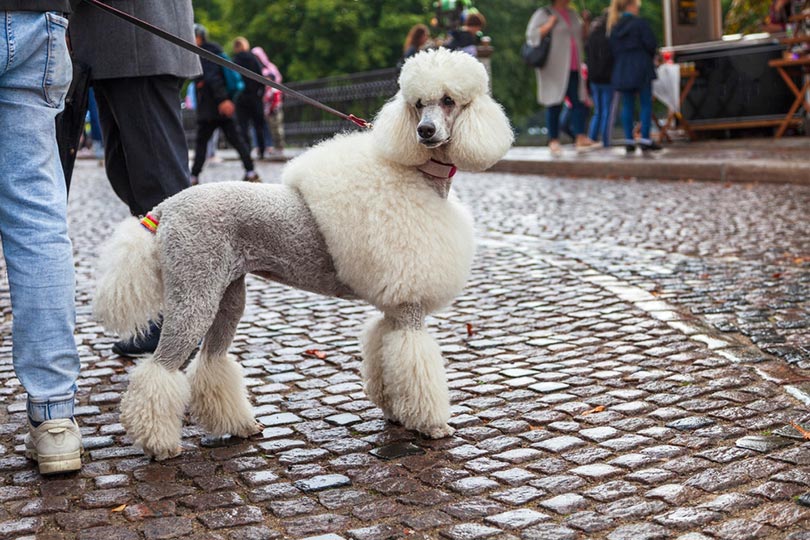
Poodles are purebred dogs, meaning their characteristics are pretty much set in stone. While individual dogs differ, you know what you’ll get with this dog breed. Therefore, their traits are pretty easy to describe.
Temperament
Poodles are extremely intelligent—one of the smartest dog breeds in the world. While this makes them very easy to train, it also means that they can become bored quickly. Therefore, they must be provided with training opportunities, puzzle toys, and similar situations to keep their brains working. Luckily, many bad behaviors can be trained out due to their high intelligence.
These dogs are very people-oriented but they can be one-person dogs in some cases. If only one family member cares for the dog, it isn’t uncommon for them to devote themselves solely to that person. While this can interfere with the dog’s relationship with others in the family, it can also lead to separation anxiety.
Of course, this also means that the Poodle is intensely loyal. These dogs are great protectors for this reason.
Health
The Poodle is purebred, so some health problems have circulated within the breed. They are generally healthy dogs, and choosing a qualified breeder can eliminate many of these conditions. Therefore, where you get your Poodle from is extremely important.
Addison’s disease is somewhat common in these dogs. It’s easy to miss this disease until its advanced stages when it can potentially be deadly.
Gastric Dilatation-Volvulus also occurs in Poodles (and any other large dog). This condition occurs when the dog’s stomach twists and begins to fill with gas. This condition is an emergency, as it can kill a dog in only a few hours. While many studies have been performed, no one has figured out what causes it.
Cushing’s disease also occurs in Poodles. Excessive drinking and urination are standard with this disease, though these symptoms are also linked to various other conditions.
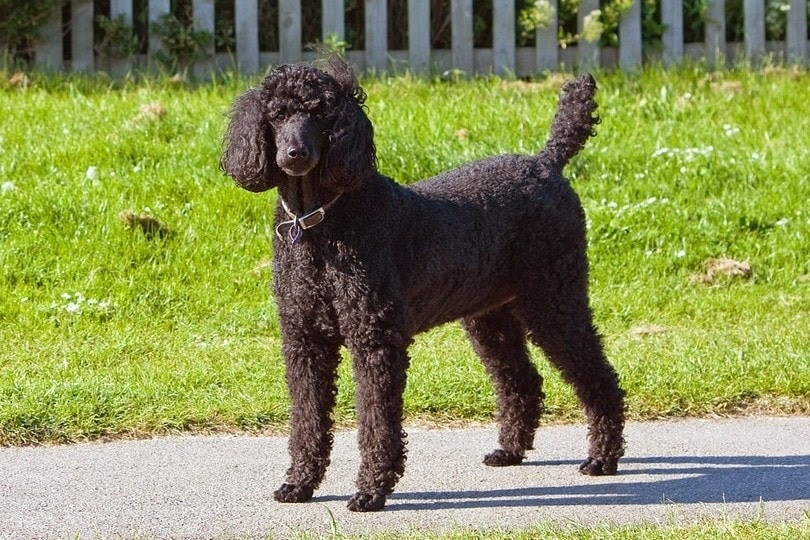
Care
Poodles tend to be a bit more high-maintenance than other breeds. As most people know, they require quite a bit of grooming. However, if you have a good groomer, you can get them trimmed down into a lower-maintenance cut.
Your Poodle does not have to look like a show dog.
Furthermore, Poodles also require a lot of exercise. Despite their reputation, these dogs are working dogs. Therefore, they have plenty of energy that needs to be run off daily. You should expect to walk them for at least an hour a day, if not more. Having a fenced-in yard is very helpful, as these dogs love to play fetch.
Because they are so intelligent, Poodles also require much mental stimulation. Without it, they can get bored quickly, leading to destructive behaviors. Therefore, training, puzzle toys, and obedience classes are necessary for this breed.
It isn’t just that they can do mental challenges. It’s that then need to do mental challenges.
Suitable For:
Poodles are dedicated, loyal dogs that form close relationships with their owners. They are highly dedicated, which makes them great for those that want a close relationship with their dogs. However, these canines do require a lot of work and we don’t recommend them for “casual” dog owners.
You’re going to be walking and grooming these dogs quite a bit. However, all Poodles have pretty similar traits so you do know what you’re getting.
Goldendoodle
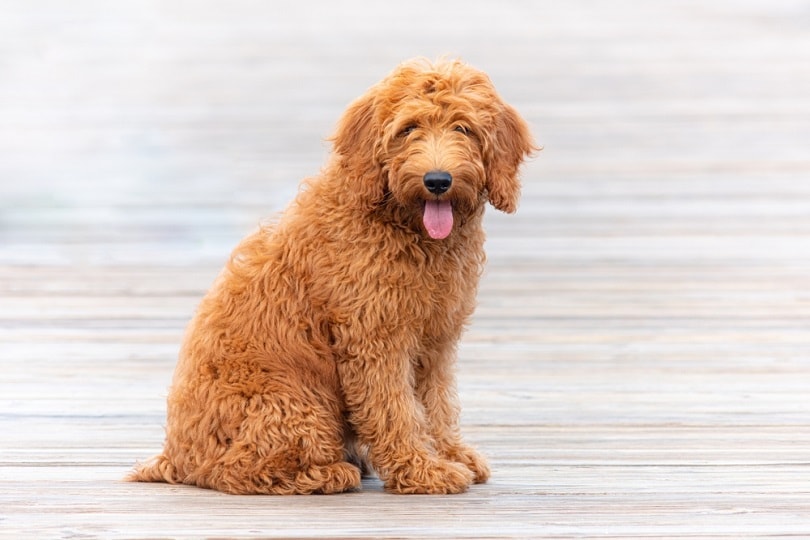
First and foremost, Goldendoodles are mixed breed dogs so their traits are less set in stone, and it can be harder to figure out what you’re getting. These dogs can be just like a Golden Retriever or just like a Poodle, though most fall somewhere in between.
Temperament
Goldendoodles tend to be highly people-oriented. They love to be with their people all the time. Of course, this is great for those that want a close relationship with their dog. However, it also means that these canines can be prone to separation anxiety.
They tend to be less one-person dogs than Poodles, though this isn’t always the case. Like Poodles, they can choose one person in a family and latch onto them.
These dogs love to socialize and love just about everyone. For this reason, they do not make good guard dogs. Everyone they meet is a friend, though they can be a bit too excited to meet them in some cases. Furthermore, they are also friendly with other dogs and people.
Goldendoodles are highly trainable thanks to their high intelligence. We highly recommend getting these dogs in training classes early to take full advantage of this trait.
Health
As a mixed breed, Goldendoodles are less likely to inherit genetic issues. Therefore, they are healthier than Poodles usually. It is still possible for puppies to have genetic dispositions to certain illnesses, though this is less likely if you purchase them from a qualified breeder.
As larger breeds, Goldendoodles are prone to joint issues. Hip dysplasia is common in both Poodles and Golden Retrievers. While diet plays a role in this disease, it also has a genetic factor so we recommend purchasing a puppy from a breeder who performs hip testing on all breeding dogs.
Willebrand disease and progressive retinal atrophy can both occur due to genetic flaws, as well. Against, breeders that test for this disease when possible and don’t breed affected dogs don’t typically produce puppies with these issues (though genetic flukes still occur).
These dogs are much healthier than other breeds. However, adopting from a qualified breeder is still recommended to avoid any nasty genetic flaws.

Care
Like Poodles, you’ll need to get your Goldendoodle regularly groomed—usually. While these dogs are often advertised as having a Poodle-like coat, this isn’t true of all Goldendoodles. Therefore, the amount of grooming required and their grooming will differ from dog to dog. Some dogs may shed more, not need to be trimmed, and require regular brushing.
However, others will have a grooming schedule similar to a Poodle’s.
These dogs require a lot of regular exercise to stay happy and healthy. They come from two different working breeds, meaning that they were bred to have high endurance and drive. Therefore, plan on walking your dog for at least an hour a day. Usually, these dogs love to fetch, so a fenced-in yard is recommended.
Furthermore, due to their intelligence, these dogs can become bored quickly. Therefore, you’ll often have to leave them with puzzle toys and train them. They love having a job to do, so competing in agility and other canine sports can be helpful.
Suitable For:
Goldendoodles are best suited for those that aren’t very picky about their dog. Because they vary so much, you won’t know what you’ll get until your puppy is grown. For instance, your Goldendoodle may not shed, or they could shed a lot.
If having a non-shedding dog is essential for you, then tossing a coin with a Goldendoodle probably isn’t the best idea.
Which Breed Is Right for You?
Because a Goldendoodle is half Poodle, both dog breeds are very similar. However, the main difference is that a Poodle is purebred, while a Goldendoodle is not. For the average pet owner, this means that a Poodle is more predictable; you know how a Poodle puppy will end up. That said, Goldendoodles can inherit any trait from either parent.
Therefore, they are a bit like a bag of surprises. You may end up with a dog with curly, Poodle-like fur, or he could have fur like a Golden Retriever (shedding and all).
You know precisely what sort of grooming a Poodle will need. However, Goldendoodles vary too much for this sort of certainty.
Typically, Goldendoodles are a bit healthier, but if you purchase your puppy from a qualified breeder, both breeds have a healthy disposition.
See also:
- Golden Retriever vs Poodle: Which One Should I Choose?
- Bernedoodle vs Goldendoodle: The Differences (With Pictures)
Featured Image Credit: (L) Daniel Savill, Unsplash | (R) everydoghasastory, Shutterstock




